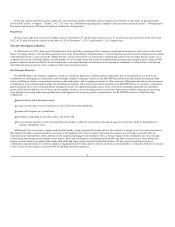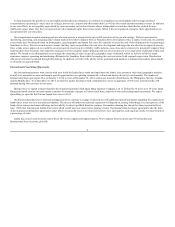Jamba Juice 2014 Annual Report Download - page 15
Download and view the complete annual report
Please find page 15 of the 2014 Jamba Juice annual report below. You can navigate through the pages in the report by either clicking on the pages listed below, or by using the keyword search tool below to find specific information within the annual report.
We are subject to the U.S. Fair Labor Standards Act, the U.S. Immigration Reform and Control Act of 1986 and various federal and state laws governing
various matters including minimum wages, overtime meal and rest periods, accommodations to certain employees, and other working conditions. Complying
with these rules subjects us to substantial expense and can also expose us to liabilities from claims for non-compliance. In addition, we pay a significant
number of our hourly staff at rates consistent with, but higher than, the applicable federal or state minimum wage. Accordingly, increases in the minimum
wage would increase our labor cost. We are also subject to various laws and regulations relating to our current and any future franchise operations. See “Risk
Factors — Governmental regulation may adversely affect our ability to open new stores or otherwise adversely affect our existing and future operations and
results.”
We are also subject to various federal and state laws that regulate the offer and sale of franchises and aspects of the licensor-licensee relationships. Many
state franchise laws impose restrictions on the franchise agreement, including the duration and scope of non-competition provisions, the ability of a
franchisor to terminate or refuse to renew and the ability of a franchisor to designate sources of supply. The Federal Trade Commission, or the FTC, and some
state laws also require that the franchisor furnish to prospective franchisees a franchise disclosure document that contains prescribed information and, in some
instances, require the franchisor to register the franchise offering.
Environmental Matters. We are subject to federal, state and local environmental laws and regulations concerning the use of polystyrene products, and
several counties in which our stores are located have already banned the use of our polystyrene cups. During 2012, we continued to make progress on certain
eco-sustainability initiatives first launched in 2009, focusing on phasing out the use of polystyrene cups, as well as increasing the use of recyclable products,
and reducing waste. Our new double-walled paper cup was launched in the U.S. during the summer of 2013, replacing our use of polystyrene cups. Our other
green initiatives include the use of more environmentally friendly packaging for our cup carriers, oatmeal cups and lids, breakfast clear cups and lids, spoons
and napkins, all of which are made from recycled material. We have also reduced the amount of corrugated cardboard used for bulk shipping, reduced
labeling requirements, and reduced freight, resulting in lower fuel emissions. We have established several optimization programs to reduce waste, such as
participation in recycling and composting programs for our food waste, where it is feasible for us to do so.
We own and/or have applied to register numerous trademarks and service marks in the United States and in other jurisdictions covering additional
countries throughout the world. Some of our trademarks, including Jamba Juice® and the Jamba logo are of material importance to the Company. The
duration of trademark registrations varies from country to country. However, trademarks are generally valid and may be renewed indefinitely as long as they
are in use and/or their registrations are properly maintained. In addition, the Company has registered and maintains numerous Internet domain names,
including “jamba.com” and “jambajuice.com.”
Each Company Store has computerized point-of-sale registers, which collect transaction data used to generate pertinent information, including sales
transactions and product mix. Additionally, the point-of-sale system is used to authorize, batch and settle credit card data. All product prices are programmed
into the point-of-sale register from the Company’s corporate office. Franchise Stores generally use the same point-of-sale registers as Company Stores, but
may elect to use alternative systems provided Company approval and certain information is shared with the Company. Franchisees set their own menu prices.
Company Stores use the Company’s licensed labor management software to record employee time clock information, schedule labor, and provide
management reports. Company Stores and many Franchise Stores use the Company’s licensed food cost management software to improve inventory
management and provide management reports.
14
























